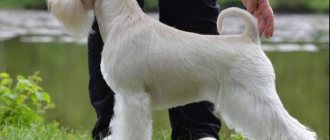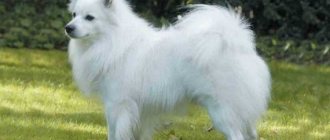Pomeranian Spitz is one of the most popular decorative dog breeds today. Celebrities, as often happens, become trendsetters: charming fluffy dogs can be seen in photographs and newsreels in the hands of Sylvester Stallone, Kelly Osbourne, Maria Sharapova.
It is interesting that representatives of this breed were not always so “toy-like”. In the Middle Ages, in the Prussian province of Pomerania (where the breed originates), these were quite large animals, but selection work did its job, turning them into mini-dogs.
Main problems
If you decide to get a Pomeranian or already own one, you should be aware of the disadvantages of this dwarf breed, such as possible diseases. After all, taking care of a dog’s physical health is the basis of its longevity. Timely detection of symptoms and the necessary preventive actions can save the Pomeranian's life.
Basically, diseases in dwarf dogs occur due to the following reasons:
- small size;
- admission to breeding dogs with hereditary pathologies;
- anatomical properties;
- poor care.
Timely vaccinations and deworming can prevent diseases such as distemper, hepatitis, leptospirosis, gastroenteritis, coronavirus, and adenovirus.
But this does not mean that after routine vaccinations, you can forget about diseases. You will have to periodically monitor your purebred dog so as not to miss the first symptoms of the disease. Lack of attention on your part and, as a result, late help can lead to serious and sometimes chronic illness.
Let's take a closer look at the main diseases that can develop in Pomeranians.
Common ailments
The most common anatomical diseases among Spitz dogs are:
- Changing teeth. The most common and first ailment of the Spitz is the change of teeth.
Those with roots that are too long cannot get rid of them naturally. Therefore, a crooked bite of the molars is formed.
Dog handlers recommend waiting until the animal is a certain age to remove baby teeth at once. In this case, teeth are changed artificially, under anesthesia.
- My eyes are streaming. The most common reason why a Spitz has runny eyes is increased sensitivity to external irritants, allergies.
Due to the specific shape of the skull, Spitz dogs are often diagnosed with eye diseases. Therefore, if the owner notices that “the eyes are running,” you should immediately contact a specialist and not self-medicate.
It should be noted that an allergy in a small Spitz can initially affect the eyes and also cause complications in other organs.
Therefore, in order for the allergy to disappear as quickly as possible, you need to know what it is and how to treat it. Daily eye examination and care are the main ways to prevent eye disease in Spitz dogs.
- A special type of cough. The specific structure of the Spitz larynx, or rather not the closedness of the cartilaginous tissues, in the presence of stressful situations, anxiety, or a serious illness, which may be an allergy, often becomes a kind of cough.
In this case, it will most likely seem to a casual passer-by that the dog is sneezing. In fact, the dog is not sneezing, but trying to moisten the larynx.
In order not to listen to the dog sneeze, it will be enough to pick him up, stroke him, and calm him down.
Anatomical properties
Pomeranians often have dental complications. Problems during the period of teeth change await many owners of a dwarf dog. The Pomeranian's first teeth have very long roots. Being deep in the gums, they interfere with the natural loss of the first teeth. As a result, problems arise with the development of molars and proper bite.
To avoid such violations, you need to periodically examine your dog's teeth. If you notice that baby teeth are inhibiting the development of primary teeth, contact your dentist immediately. He will remove your pet's first teeth, saving you and your baby from problems.
If you feel that your toy dog has bad breath, it is possible that tartar is developing in its mouth. It can occur due to heredity, poor diet, malfunction of the gastrointestinal tract, and liver. In this case, you need to properly balance your diet.
Tartar develops from plaque on the teeth, which must be removed periodically. To do this, you need to brush your teeth on time using a brush and a special dog paste. If this disease is neglected, complications in the future cannot be avoided - from inflammation of the gums to the loss of diseased teeth.
Another trouble caused by anatomical features is a sudden cough. Dogs of this breed have an unusual structure of laryngeal cartilages with a ring-shaped open structure. The spasm of these cartilages leads to coughing. This usually happens after physical activity or going outside. To stop the coughing, you need to calm your pet.
Pomeranians also have eye problems. The dwarf dog has too sharp a transition from the forehead to the nose. Due to this structure of the skull, the pet's eyeballs become too vulnerable to strong wind, dust or hot weather. At such moments the dog begins to “cry”. To help your pet, you need to purchase special eye drops, for example, Visotomin.
Tearfulness can also occur due to inflammation, eye damage, or abnormal tear flow. Sometimes puppies are born with a hereditary disease such as retinal atrophy. In such cases, you need to contact a veterinarian for timely treatment.
Teeth
The miniature size of oranges is by no means a miracle of nature, but the result of the work of breeders, so the majority of diseases are associated with this circumstance. If annual vaccination saves you from “standard” infectious and viral diseases, then dental problems cannot be solved with one injection. The Spitz's dental system is quite weak; due to its small size, the teeth cannot withstand heavy loads and quickly fall out. Difficulties begin from puppyhood, when teeth change.
Another scourge of the breed is the formation of tartar, which is accompanied by pain, inflammation and bad breath. The cause may be a genetic predisposition or disorders associated with the gastrointestinal tract. Therefore, it is worth taking preventive measures, starting the fight against the plaque that has formed on the teeth. There is no need to wait for tartar to form; teach your puppy to brush his teeth. Don't expect a bone purchased from a pet store to do all the work for you. Spitz are not able to clean their teeth on their own: bone that is too soft does not give the desired effect, and hard bone is beyond the power of Spitz.
Hereditary diseases
In addition to problems with teeth and eyes, the ancestors of the Pomeranian Spitz could genetically transmit the following diseases:
Hypothyroidism is a malfunction of the thyroid gland caused by pathology of the endocrine system. Symptoms of this disease are a lethargic state of the pet, rapid weight gain, skin dermatitis, hair loss, and otitis media. Kidney diseases also lead to problems with the quality of the coat, up to and including “black skin disease”.
It is believed that such diseases occur due to hormonal imbalances in the animal’s body.
Epilepsy is a disorder in the functioning of the dog’s brain. This disease has no cure and does not appear immediately, until after two years. An attack of epilepsy is accompanied by convulsions, up to loss of consciousness. To help your Pomeranian, you need to administer an anticonvulsant, for example, Phenotoin.
Dwarfism is a congenital disease of dwarfism when growth hormone is not produced. The Super Mini Pomeranian is a prime example of the disease. It is because of this disease that the dog usually develops complications with the nervous system, bulging of the eyeballs, and baldness.
Unfused fontanel is a hereditary disease when the bones of the skull never come together.
Pomeranians can also inherit complications with the spine, a congenital umbilical hernia.
Breeders' mistakes
Sometimes there are pathologies in dogs that are associated with breeder mistakes. Such diseases are already predetermined by heredity.
To prevent the breed of decorative dogs from degenerating, breeders perform castration. Only castration of a “defective” animal can prevent the reproduction of sick dogs.
Also, castration of a dog can be carried out due to the personal preferences of the owner.
If a dog marks, is too aggressive, or attacks others, specialists will also prescribe castration.
By the way, in the UK, castration is performed only after genetic testing of the dog.
And only if pathologies of organ function and complex diseases are identified, castration is prescribed. In all other cases, the dog is treated.
Small size
The small size of Pomeranians often leads to diseases of the animal's bones and joints.
Due to weak ligaments in the limbs, a dislocation of the kneecap is possible. The cause of the problem may be stress on the joints due to active games, jumping or excess weight. The main symptoms of a dislocation are fatigue, lameness and pain when stepping on the damaged paw.
Pomeranians often experience bone displacements, even fractures. To prevent this from happening, you should not allow your pet to jump from high places - do not put the dog on sofas or chairs, and do not force him to overcome barriers that are not tall enough for him.
To reduce the risk of such complications, you need to balance the diet of the Pomeranian Spitz - introduce a special vitamin and mineral supplement for dwarf breeds. Be sure to monitor your pet's weight. If a dislocation or fracture does occur, you need to contact a surgeon, he will help your dog.
Features of miniature dogs
Pathologies of Spitz, like many other small breeds, are associated with the formation of the skeletal system and joints.
If the dog is even a little out of shape, that is, overfed, then dislocations, fractures, and dysplasia will be companions at every step.
To reduce the likelihood of injury, Pomeranians should receive:
- a balanced diet, where every calorie (vitamin) will be in its place;
- physical activity to maintain muscle tone.
Dog handlers do not recommend allowing Spitz dogs to jump from heights or go down (climb) high steps.
Consequences of poor care
If you are lazy and do not take care of your Pomeranian, then problems with its health will not be avoided.
Once every three months, your pet must be treated with special products against fleas and ticks, for example, “Bars” will cope with this task perfectly. If this is not done, insects will begin to parasitize the animal’s fur and skin. They cause diseases such as dermatitis, encephalitis, allergies and many others.
An incorrect balance in an animal’s diet leads to major complications with the gastrointestinal tract, diseases of the liver, kidneys, joints, and allergic reactions. There is no need to overfeed your pet or give food from your table. This will not please the baby, but will cause him great harm. It is best to contact your veterinarian to determine the appropriate diet for your toy dog.
Also, don’t make your Pomeranian a couch potato. Otherwise, his muscles and immunity will weaken. Go for walks as often as possible, but do not overtire your pet. Fresh air and moderate physical activity will help in the proper physical development of the animal.
Don't forget about your baby's hygiene. A periodic general examination of the dog, proper care and trips to the veterinarian will save you from diseases of the eyes, teeth, ears, and fur.
Remember that the health of your pet depends entirely on you.
If this article helped you, share it with your friends.
Problems with the gastrointestinal tract. Obesity
Although Spitz dogs are unpretentious in food, they rarely suffer from allergies and other diseases associated with the functioning of the metabolism; very often a good appetite, along with excessive indulgence on the part of the owner, becomes the cause of obesity
. Obesity entails gastrointestinal upset, which leads to dysbiosis, the Spitz begins to regurgitate parts of the food consumed, the dog's activity decreases, and the load on the musculoskeletal system increases.
To prevent obesity, you should not unnecessarily pamper both the puppy and the adult Spitz; in no case overfeed him. And if you notice the first signs of excess weight, you need to start taking action: review your diet, eliminating fatty and poorly digestible foods, and reduce portions. Of course, your baby will start begging, you should not give in. Otherwise, he will understand that he can continue to do this.
Remember that proper nutrition is the basis for good Pomeranian health.
Another problem you may encounter is colitis in small puppies. They arise because there is a transition from mother's milk to solid food.
But colitis can also occur in adult dogs, like gastritis; this is a predisposition in some dogs and is not a characteristic disease of Spitz: dogs of other breeds also suffer from it.
Upper respiratory tract diseases in dogs
- Laryngitis and laryngopharyngitis
are the main symptoms of the disease, such as loss of appetite or complete refusal to eat, deterioration in general health - lethargy, loss of voice, and lymph nodes may be enlarged. This is an infectious disease that can be caused by cold food, cold water, a tight collar, or continuous barking. - Narrowing of the trachea
- collapse - is a non-infectious disease that can be caused by: foreign objects, abscesses, tumors. Collapse can also be a congenital disease or as a result of injury - local tracheal stenosis. This disease is accompanied by symptoms such as decreased appetite, bad mood, and weakness.
Causes of cough in a Spitz
The most common and common is a long and active walk. Or this kind of cough occurs after eating. Spitz coughs as if he is trying to free his throat from a foreign object that causes him discomfort.
The dog is also characterized by light grunting. This process has a biological interpretation - it is a spasm of the cartilaginous larynx. The fact is that Spitz dogs have a unique structure of the larynx, due to a genetic predisposition. The shape of the cartilage of the larynx is ring-shaped and open, which is what causes coughing under such circumstances.
There is really nothing scary or dangerous about this for your beloved Pomeranian. Let him calm down a little, come to his senses, so to speak. And everything will fall into place.
Tracheal collapse is another, more serious, but rare cause of coughing in Spitz dogs. The disease is genetic, caused by deformation of the tracheal rings. During this process, the trachea thickens, acquiring a new crescent-shaped shape. As a result, the lower and upper walls of the trachea come into contact. The consequences are very different. Sometimes this leads to both suffocation and death.
Returning to the origins of the article, we can conclude that, apart from vigorous activity and sometimes simple eating, the causes of cough and spitz are difficult to detect. After all, they are representatives of the category of healthy animals. But still, the “one in a million” case has not been canceled. It happens that your little friend may be susceptible to respiratory diseases or tracheal collapse. A rare occurrence, but it occurs when the cough does not go away for a long time. In such a situation, you should not postpone a visit to a competent veterinarian. Prevent the problem as soon as possible and the fluffy miracle will smell healthy again.
Pomeranian Spitz
– an excellent choice for both a professional dog breeder and a lover of small dogs.
They are playful and attractive in appearance, prized at exhibitions and rarely get sick.
.
But sometimes illnesses occur in Spitz dogs, and the owner must know the symptoms of an impending problem and react to them correctly.
Spitz,
Unlike many dogs,
they are unpretentious when it comes to food
: they can eat meat and indulge in porridge. In this advantage lies a great danger, since an incorrect diet or an accidental bone on the street can lead to a problem.
Gastritis
With gastritis, the inner lining of the stomach becomes inflamed and it ceases to perform its functions.
It has two forms: acute and chronic.
The acute form occurs when the dog has eaten a lot of food that is harmful to the gastric mucosa: too fatty/spicy/cold/hot, spoiled. The chronic form appears either as a consequence of an untreated acute form, or as a result of long-term (over 1-4 weeks) exposure to small doses of bad food on the stomach. It’s better for your pet, or buy
Symptoms:
- For the acute form
– vomiting, slight fever, bad breath. - For the chronic form
- loss of appetite, constipation or diarrhea, vomiting (without connection with food intake). The stomach is swollen.
Treatment
: choosing the right diet, eliminating symptoms.
Ulcers in the gastrointestinal tract
Peptic ulcer disease most often develops as a consequence of untreated gastritis. The tissues that make up the gastrointestinal tract are destroyed with the formation of holes and “holes”. An ulcer can lead to the death of your pet.
Symptoms
: vomiting blood (stomach ulcer), diarrhea with blood (intestinal ulcer). The pain is pronounced, there is no appetite.
Treatment:
medications or surgery, depending on the condition of the sick dog.
Intestinal obstruction
The obstruction in the intestines is almost always either a foreign body or dry feces. A foreign body can enter the intestines when the owner did not keep an eye on the Spitz, who saw “this tasty-looking thing lying on the ground.” Dry stool often occurs in older or dehydrated dogs.
Symptoms
: prolonged constipation, bloating.
Treatment
: drink plenty of fluids if necessary, take laxatives. Most often, surgical intervention has to be used, since in Pomeranians, due to their small size, even a piece of sausage wrapper can cause a major obstruction.
Food poisoning
The list of edible and not-so-edible things that can poison a Spitz is huge: from dry food to rat poison. Poisoning from spoiled food products is the most common.
Symptoms
: vomit.
Treatment
: activated charcoal, drink plenty of fluids after the stomach has cleared. During a vomiting attack, you need to remove the collar to avoid suffocation.
Don't scold your dog for ruining the carpet.
– she does not control the process.
Important!
If there is blood in the vomit, the dog has difficulty breathing or behaves strangely, you need to urgently take it to the veterinarian, as poisoning from poisons, tablets or chemicals is possible.
Lower respiratory tract disease in dogs
- Acute bronchitis in dogs
- often caused by pneumonia. The main symptoms of the disease are a strong and wet cough with attacks, even if the dog is feeling well. An attack can occur after sleep, when the dog wakes up, inhales a lot of air or swallows accumulated mucus. - Chronic bronchitis in dogs
- main symptoms: dry, short cough, there may be nasal discharge. Very often the disease occurs with complications (atelectasis, emphysema, bronchiectasis, pulmonary fibrosis). - Allergic bronchitis in dogs:
- Acute allergic bronchitis caused by drug intervention, dog insect bite.
- Chronic bronchitis - caused by an allergy in a dog. The cause of this disease can be the entry of foreign bodies (seeds, spikelets) into the bronchi. These bodies cannot be coughed up even with a strong cough from the bronchi and over time become covered with mucosal cells, which contributes to their “ingrowth”.
With bronchitis, a dog’s cough manifests itself mainly at night and prevents the pet from falling asleep.
Also, with similar diseases and a general symptom - a cough in a dog, the pet can behave very well, have fun and be in a good mood, and you will not even suspect that a serious illness is evident, in any case, consult a veterinarian, do not risk the dog’s health, because it is completely in your hands and depends on the decision you make. If the cause of everything is heart failure and the disease is in an advanced state, then it is very difficult to recover.
Take care of your health and the health of your faithful friend!











